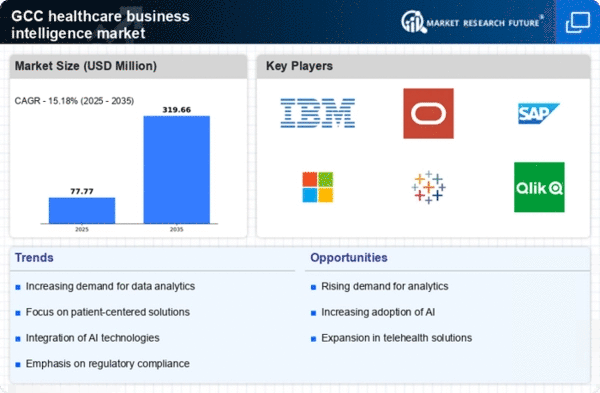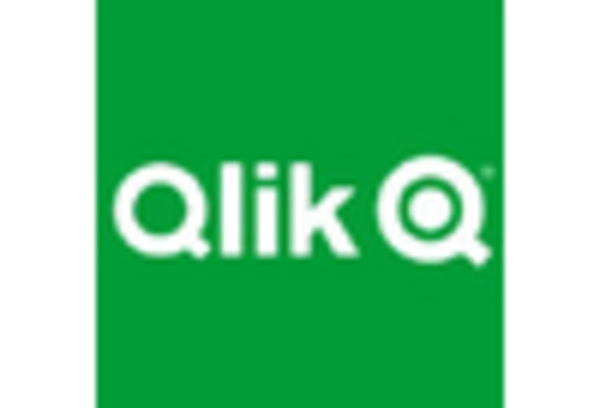Government Initiatives and Funding
Government initiatives and funding play a crucial role in shaping the healthcare business-intelligence market. In the GCC, various governments are investing significantly in healthcare infrastructure and technology to enhance service delivery. For instance, initiatives aimed at digitizing health records and promoting interoperability among healthcare systems are gaining traction. Such investments are expected to reach approximately $1 billion by 2026, fostering an environment conducive to the growth of business intelligence solutions. These initiatives not only facilitate the adoption of advanced analytics but also encourage collaboration among healthcare providers, technology vendors, and regulatory bodies. As a result, the healthcare business-intelligence market is likely to benefit from increased funding and support, driving innovation and the development of new solutions tailored to the unique needs of the region.
Growing Emphasis on Patient-Centric Care
The healthcare business-intelligence market is witnessing a growing emphasis on patient-centric care, which is reshaping how healthcare providers operate. In the GCC, there is a shift towards personalized medicine and tailored treatment plans, driven by the need to enhance patient satisfaction and outcomes. This trend is reflected in the increasing use of data analytics to understand patient preferences, treatment responses, and health outcomes. By leveraging business intelligence tools, healthcare organizations can gain insights into patient demographics and treatment efficacy, enabling them to deliver more effective care. The focus on patient-centric approaches is likely to drive the demand for advanced analytics solutions within the healthcare business-intelligence market, as providers seek to align their services with the evolving expectations of patients.
Increased Focus on Operational Efficiency
An increased focus on operational efficiency is emerging as a key driver in the healthcare business-intelligence market. Healthcare organizations in the GCC are under pressure to optimize their operations and reduce costs while maintaining high-quality patient care. This has led to a growing interest in business intelligence solutions that can streamline processes, enhance resource allocation, and improve overall performance. The market is projected to grow by approximately 12% annually as organizations seek to implement data-driven strategies that promote efficiency. By utilizing analytics to identify bottlenecks and inefficiencies, healthcare providers can make informed decisions that lead to better resource management and improved patient outcomes. This focus on operational efficiency is likely to propel the healthcare business-intelligence market, as organizations strive to achieve sustainable growth in a competitive landscape.
Rising Demand for Data-Driven Decision Making
The healthcare business-intelligence market is experiencing a notable surge in demand for data-driven decision making. Healthcare providers in the GCC are increasingly recognizing the value of leveraging data analytics to enhance operational efficiency and patient outcomes. This trend is underscored by a projected growth rate of approximately 15% annually in the adoption of business intelligence tools. As healthcare organizations strive to improve service delivery and reduce costs, the integration of data analytics into clinical and administrative processes becomes paramount. The ability to analyze patient data, operational metrics, and financial information allows stakeholders to make informed decisions, ultimately leading to improved healthcare services. This rising demand for data-driven insights is likely to propel the healthcare business-intelligence market forward, as organizations seek to harness the power of data to drive strategic initiatives.
Technological Advancements in Data Management
Technological advancements in data management are significantly influencing the healthcare business-intelligence market. The emergence of cloud computing, big data analytics, and real-time data processing capabilities is transforming how healthcare organizations manage and analyze data. In the GCC, the adoption of these technologies is expected to increase, with a projected market growth of around 20% over the next five years. These advancements enable healthcare providers to store vast amounts of data securely and access it efficiently, facilitating timely decision-making. Moreover, the integration of advanced data management solutions allows for better data visualization and reporting, which are essential for effective business intelligence. As technology continues to evolve, the healthcare business-intelligence market is likely to expand, driven by the need for innovative data management solutions.

















